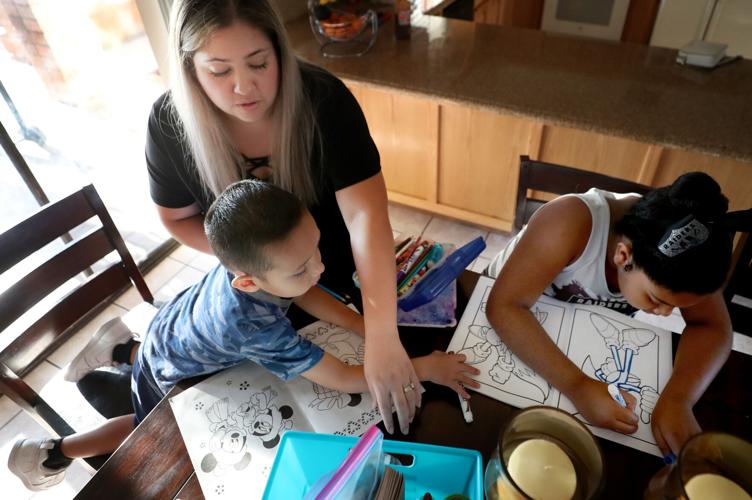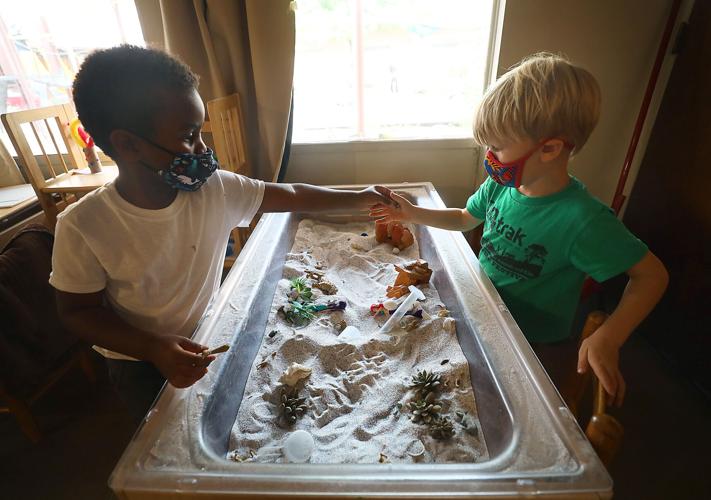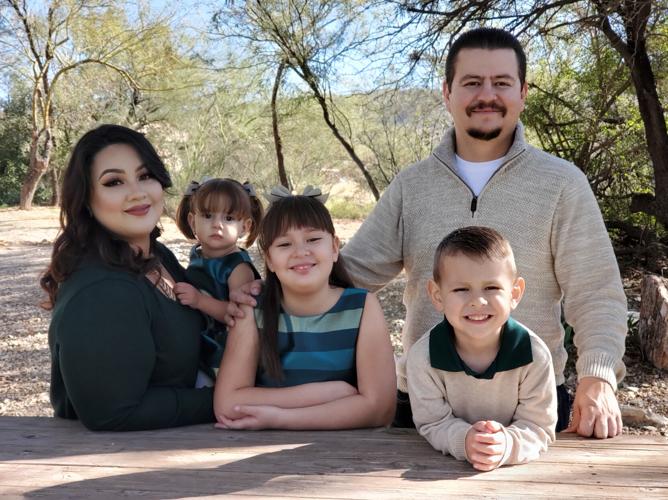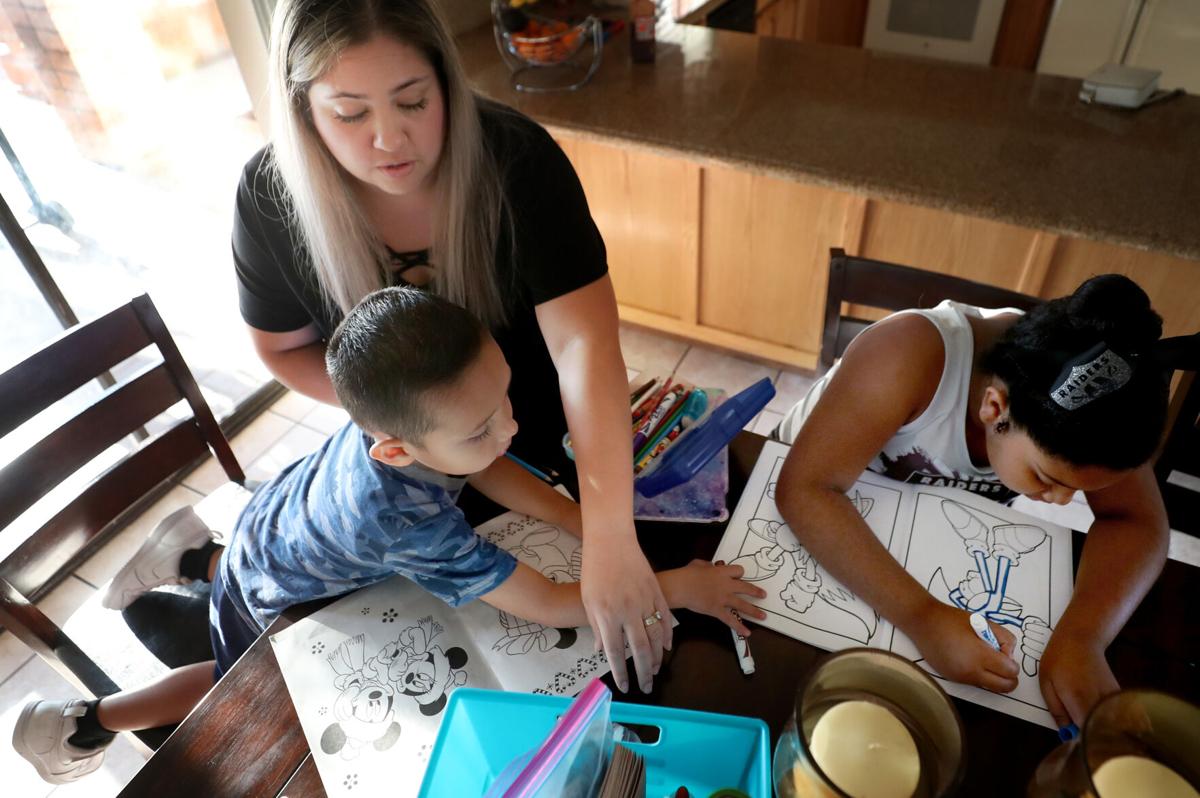This story was made possible by a grant awarded to La Estrella de Tucsón by Solutions Journalism Network, an organization dedicated to promoting journalism that analyzes community responses to specific problems.
A couple of months after her 3-year-old daughter Mariah began attending free preschool through Head Start, Tucson mom Janet Cervantes noticed something pretty amazing.
Normally, the toddler’s reaction to someone taking a toy from her involved a lot of screaming and crying, Cervantes recalled.
“After the teachers working with her at school, she completely changed,” Cervantes said. “She actually started saying, ‘Hey, I was using that. Can you please wait your turn?’ There was a lot more communication than just tears and yelling.”
Now 8 years old, Mariah is thriving in elementary school, and in August, Cervantes started her 4-year-old son Juan Enrique in Head Start’s extended-day program. The full-day option was crucial to Cervantes, allowing her to work more hours at In-N-Out Burger, as well as giving her son an extra boost before he starts kindergarten next year.
“He’s never actually been around kids his age, especially with the pandemic,” Cervantes said. “He missed out for a whole year on a lot of things. I’m happy that he’s finally in the classroom and he’s finally getting a feel of all that.”
Head Start, and other providers of high-quality early childhood education, are getting a boost this fall, thanks to a $10 million infusion of funding approved by the Pima County Board of Supervisors in May.
The funding will benefit more than 1,200 low-income children whose families could otherwise never afford quality preschool.
“I can’t stress enough what an exciting time it is for high-quality early learning in Pima County,” said Jessica Harrington, senior regional director in Southern Arizona for First Things First, the state’s early childhood agency. The agency offers support and grants to those providing services to children ages birth through 5. “To see the community come together in the spirit of supporting young children and families is just really inspiring.”
The new county program, known as Pima Early Education Program Scholarships, or PEEPS, funds access to preschool in three ways:
First Things First will offer an additional 599 scholarships for low-income children to attend high-quality preschools enrolled in the agency’s “Quality First” program;
Seven school districts will offer high-quality preschool to an additional 480 children;
and Head Start preschool programs will offer extended day programs for an additional 205 children at its locations in Pima County.
Prohibitive cost
Averaging $836 per month, the cost of child care for a toddler is nearly as much as the average cost of rent for an a one-bedroom apartment in Tucson — about $900 a month — making it prohibitively expensive for most families, according to a 2018 research brief from the University of Arizona, commissioned by the Women’s Foundation of Southern Arizona.
Cervantes, who earns about $20,000 per year, plus her husband’s income as a truck driver, said she’s grateful for the free early-education opportunities provided by Head Start. She has friends who pay $200 per week for child care.
“I’m like, holy moly, that’s a lot,” she said. “I feel like this should be available to anyone.”
Ninety percent of a child’s brain growth happens before age 5, so investments in early education during this time period pay off exponentially down the road.
Social-emotional intelligence gained in preschool paves the way for academic and career success, said Reem Kievit, director of early childhood and community education for the Tucson Unified School District, which is building out new preschool classrooms to accommodate PEEPS students.
“You reduce school dropout rates, you’re reducing poverty, you’re creating adults that can go into the workforce or go into college and be successful,” she said.
Preschool promise
While advocates are celebrating the local funding devoted to child care, getting here wasn’t easy — and there’s still a long path ahead before access to preschool is universal.
The win comes four years after the failed Strong Start Tucson ballot initiative was rejected by voters, dashing advocates’ hopes to address the child care crisis. The proposed half-cent sales tax increase would have generated about $50 million annually to help pay for children to attend high-quality early learning programs.
Bill Berk, former director of Outer Limits preschool, was one of the leading advocates for Strong Start Tucson, which failed by a wide margin in the 2017 local election.
“When we got killed at the ballot box, the people who were against Strong Start Tucson eventually came to us and said, ‘We know we need to do something. But we didn’t like what you had designed,” he said. “It started the conversation.”
The importance of early childhood education is no longer controversial. A recent survey of 400 people, commissioned by the Arizona Early Childhood Funders Collaborative, found 76% of Arizonans support the state investing in early childhood education for children ages birth to 5.
The broad support comes from the proven benefits — socially and economically — of investing in children from a young age, said Monica Brinkerhoff, associate vice president for early childhood education for the United Way of Tucson and Southern Arizona, which was also a leader in Preschool Promise.
The estimated return-on-investment for high quality early education is between $7 to $12 for every dollar invested, according to research by human development researcher and economist James Heckman, she said.
“It’s just a good investment,” Brinkerhoff said. “It’s good for the community, it’s critical to a stable workforce now and it helps prepare the workforce of tomorrow.”
So advocates regrouped, launched years of focus groups and established Preschool Promise, a diverse community-wide working group, including representatives from the business community, nonprofits, parents, educators and public sector stakeholders like the County Administrator’s office — all committed to finding a solution to the child care crisis.
“You can fail spectacularly, figure out what you did wrong, engage the people who told you you were wrong, and come up with a different path forward,” said Kelly Griffith, executive director of the Center for Economic Integrity in Tucson and a leader in the Preschool Promise initiative.
The group tried to address all the objections to Strong Start Tucson, including criticisms that it would only benefit children within the city limits and that the proposed tax had no expiration date. Preschool Promise leaders also made sure to solicit opinions from rural and tribal communities, bringing them into the fold.
On entrenched social issues, “it really takes a collective approach. We need all hands on deck, we need the whole community to come together,” Brinkerhoff said.
The resulting PEEPS framework is a testament to the power of finding consensus by engaging one’s critics, Harrington said.
“This felt like a true community effort,” said Harrington, who provided data from First Things First during her work with Preschool Promise. “We really want to ensure that it’s not just about young children accessing early learning — it’s about them accessing quality early learning. That’s when we yield the greatest outcomes.”
Expanding access
Before finding Head Start a few years ago, Tucson medical assistant Cielo Higuera was paying $300 per week for child care for her son Christian.
“Rent and child care were my most expensive bills. Not even the electric bill with the AC going all day,” she said. “I was pretty much working for rent and child care.”
Christian, 6, is now in first grade, but Higuera’s 3-year-old Chloe now needs child care. Higuera recently got a job offer to do patient intake at St. Mary’s Hospital emergency room, and Head Start’s extended-day preschool program for Chloe allowed her to accept the job offer.
“She’s super attached to me. At first I was very nervous,” Higuera said. “It seems like a very long day for a 3-year-old. But she’s been in it two weeks now and it’s proving to be very good for her. The first day she had a rough time but after that, she just leaves the car by herself like, ‘Bye, mommy, see you later.’”

Cielo Higuera, left, recently got a job offer to do patient intake at St. Mary’s Hospital emergency room, and Head Start’s extended-day preschool program for her 3-year-old Chloe allowed her to accept the job offer. Also pictured are Alain Valencia with children Camila Valencia, 10, and Christian Valencia 6.
Head Start, which has 11 preschool classrooms in 10 sites across Tucson, received $1.1 million for the current year from the PEEPS funding, said Erin Lyons, CEO of Child-Parent Centers, the Head Start grantee for Southeastern Arizona. The agency serves 2,900 children across five counties, including 1,700 in Pima County.
While some parents prefer the partial-day option for their kids of 3½ or 4 hours of care, most need a full day of care and education for their kids, due to their work or school schedule, she said.
But there are never enough extended-day slots available, she said.
“Sometimes parents can’t enroll with us, even though they really want to, because we don’t have space in classrooms with longer hours,” Lyons said. “We’re grateful for the opportunity” to expand availability.
Tucson’s largest school district, TUSD, is integrating new classrooms into its existing free preschool programs, located at elementary schools throughout the district. Those programs are inclusive, meaning they are 50% students with special needs — social, emotional or academic — and 50% students who are typically developing, Kievit said.
Before the pandemic, TUSD often had 1,000 families on the waitlist for that program, she said.
“That’s why we were really excited to get eight new classrooms, because the demand is much higher than the supply,” she said.
But demand still exceeds supply: TUSD has already received more than 200 applications for those 144 slots funded by PEEPS, she said.
Educator shortage
Advocates acknowledge that the PEEPS approval is just the beginning. Many high-quality child care centers closed during the pandemic, and a shortage of preschool educators means existing centers are still scrambling to hire teachers.
Tucson Unified and Amphi school districts have had to delay the opening of their new PEEPS-funded classrooms until October, because they’re still struggling to find high-quality staff, said Nicole Fyffe, assistant to County Administrator Chuck Huckelberry.
Kievit of TUSD said the district is devoting all of its PEEPS funding to the salaries of certified teachers in the new PEEPS classrooms. Each of its eight new PEEPS preschool classrooms will have a maximum of 18 students each, adding capacity for an additional 144 kids total, ages 3, 4 and 5, she said. Each classroom will also have two teaching assistants, whose salaries will be covered by the PEEPS funding.
Other costs, like furniture and materials, will be covered out of TUSD’s budget.
“We want to make sure and focus on quality,” she said.
But despite a commitment to paying teachers a higher wage, TUSD has not been able to find educators to fill those positions, she said.
“Families are so desperate to get started. They call us all day, every day, ‘When can my kids start?’” Kievit said.
Kievit said the fourth wave of the COVID-19 pandemic is certainly driving the hesitancy among educators. Yet she’s surprised at the extent of TUSD’s hiring challenges.
“I don’t know what else to do,” she said in late August. “We’ve partnered with all the colleges and universities: Pima, UA, ASU. We’ve reached out to DES and they’re trying to recruit for us. … It’s insane. Where are the people?”
Recruiting teachers is also almost impossible at the pay rates that most preschools are able to offer, said Berk, former director of Outer Limits preschool.
Berk said he and his wife began their work in early childhood education because they cared deeply about providing high-quality learning opportunities to children, no matter how much money their families earned. But he soon learned that to keep the school operating would require tuition from more families who could afford to pay out of pocket.
“We went into this wanting to work with all families, wanting to make sure everybody has access to high-quality preschool,” he said. “But the fact was, if we stuck to our guns, we would not be in business.”
Like most preschools, Berk said most of his teachers were low-income, single mothers, and three-quarters of them only had a high school degree. With Berk’s support, and professional development funding from First Things First, many worked to get a degree from Pima Community College, he said.
But Berk was pained that he couldn’t pay his educators what they were truly worth and still keep his business open. The realization of the impossible financial calculations facing preschool directors led him to start focusing on public policy, in an effort to change the entire system.
“The whole system is balanced on the backs of primarily low-income, single, uneducated women,” he said. “That’s who is working in this field, most of them because they care so much about kids and are willing to do a really difficult job, for very little money.”
The crucial pillars of high-quality preschool include highly educated teachers and small classes with low student-to-teacher ratios, he said.
“That all costs way more than even middle-class families can afford, if they’re paying the true cost of child care,” he said.
The needle is starting to move in the right direction, advocates say.
Arizona Department of Economic Security reimbursement rates for child care centers were stagnant for almost 20 years, until rates finally went up in 2019, said Barbie Prinster, program director for the Arizona Early Childhood Education Association, a membership-based nonprofit that represents licensed child care centers.
But still, “we aren’t paying them what they’re worth,” Prinster said. “We’re not just day care providers or babysitters — we’re building brains.”
Quality learning
At Desert Spring Children’s Center in Tucson, the teaching philosophy is rooted in the Montessori and Waldorf schools of thought, and the “Reggio Emilia” learning philosophy. The Reggio philosophy emerged in Italy after World War II with an eye toward inoculating children against the rise of dictators by supporting free-thinking and tolerance, Director Sara VanSlyke said.
It’s a community-led, collaborative learning philosophy, in which children bring ideas and questions, and teachers and parents follow their lead, she said. The school has a rich environment for exploration, with a science center, sand and water tables for art exploration and a playground with gardens, trees and tons of lizards for nature exploration, VanSlyke said.
Teachers are trained to create the most positive environment for children, from using warm voices, eye contact and body orientation to engage children in positive interactions, she said. It’s that attention to children that helped the center achieve five stars in First Things First’s voluntary quality rating system, “Quality First,” she said.
“Getting four stars is hard enough, but a five-star (rating) is really grueling,” she said.

Otto Sandy, left, and Jasper Smith play together at an indoor sandbox in a preschool class at Desert Spring Children’s Center, 740 E. Speedway. The center achieved five stars in First Things First’s voluntary quality rating system.
Desert Spring has eight Quality First scholarships, which cover about $600 of the center’s $850 monthly rate, she said. Parents with scholarships only have to pay half of the remaining amount per month, she said.
PEEPS support for those scholarships may be a drop in the bucket, but “it’s a big deal,” VanSlyke said. “Every family that is helped and every child that is helped, that is making a difference in that family’s life. It might be a drop (in the bucket), but every drop is important.”
Aurelia Lozano just started teaching at Desert Spring. Lozano, who dropped out of high school when she had her first child at age 17, noted that she was hired based on her four years of experience working with children in the YMCA and her warm personality, Lozano said.
Lozano said when her son Aydan was born, Lozano was just learning how to be an adult, while raising her baby and looking for work.
“I had to drop out of high school to focus on being a mom,” she said. “At that time, I didn’t realize how important education was.”
But having her own children has changed her perspective on schooling, she said. Lozano is finishing her GED and making plans to get an associate’s degree at Pima, followed by a bachelor’s at UA. That type of focused professional development is common among teachers at Desert Spring, Lozano said.
“Being around those teachers really showed me it’s possible,” she said.
After 10 years together, Lozano and the father of her children are engaged. They now have a 3-year-old daughter, Azareya, who attends Desert Spring on a PEEPS scholarship, in the classroom next door to where Lozano teaches. Azareya is thriving in preschool, she said.
The PEEPS program is expanding scholarships offered through “Quality First.”
First Things First, which is funded through a tobacco tax, launched Quality First a decade ago, said Liz Barker Alvarez, the agency’s policy director. The program partners with providers to improve the quality of their programs through an initial assessment that identifies strengths and weaknesses; a child care health consultant who can help with quality health practices, and incentives and funding for quality improvements, such as new playgrounds or professional staff development, Barker Alvarez said.
Preschool programs that score at least three out of five stars on First Things First assessments can offer Quality First scholarships to parents earning up to 200% of the federal poverty level. For a family of four, that’s $53,000 per year. (DES subsidies for child care go to families earning up to 165% of the federal poverty level.)
In 2013, when Quality First released its first provider ratings for its 850 participating programs, about one-quarter of them met or exceeded quality standards, meaning they earned between three and five stars, on a five-star scale, she said.
By 2020, 79% of more than 1,000 participating providers in Arizona received between three and five stars, she said.
Those improvements sometimes took years of concerted effort and support, she said.
“It takes time, it takes intentionality, it takes resources, and providers need ongoing support to maintain that” level of quality, she said.
In Pima County, close to 200 Pima County early care and education providers are participating in Quality First, and 142 of them were allocated PEEPS scholarship funding, said Barker Alvarez of First Things First. That includes 118 center-based providers, including school districts, and 24 family child-care homes. And 114 of the PEEPS providers also have a contract with DES, she said.
Sustainable change
In the Sunnyside Unified School District, 83% of students in the district qualify for free/reduced lunch — an indicator of poverty — and scholarships for quality preschool are in high demand, said Ana Gallegos, SUSD chief of schools officer. At times, the district has had up to 80 families on the waiting list for preschool scholarships.
With the PEEPS funding, the district is adding two classrooms for scholarship students this year at its Ocotillo Early Learning Center, on South Campbell Avenue, Gallegos said. Ocotillo has a five-star rating from First Things First’s “Quality First” program, which it has been a part of for 10 years.
“What this means is now we can serve more families, especially our needier families,” she said. “God, it’s almost like a lifeline, to be able to offer a quality preschool program and that will also ensure the children will be ready for kindergarten — and not just kinder, but for the future.”
Crucially, PEEPS funding is supposed to be sustained over the long-term, Gallegos said.
A few years ago, Sunnyside received a grant that funded the construction of six extra preschool classrooms.

Arwen Haskell plays at the indoor sandbox in a preschool class at Desert Spring Children’s Center.
But, Gallegos said, “When the grants went away we had to close them.”
“For us, it is very encouraging that Pima County wants to make this a sustainable project,” she said. “If the funding is there, we’re looking forward to next year adding two or three more preschool classrooms.”
The Pima County Board of Supervisors recently approved a plan to devote federal American Rescue Plan Act dollars to fund PEEPS for the next three years, Fyffe said.
“The beginning”
The need for early childhood education is only one pressing issue related to children’s well-being, said Harrington of First Things First. Nearly one in five Arizona children lived in poverty in 2019, according to Kids Count data, a project of the Annie E. Casey Foundation.
“There’s a lot to talk about, and I hope we continue the conversation,” Harrington said. “This is just the beginning.”
Universal preschool must be the ultimate goal, educators agree.
“We really believe every child should have access to high-quality early education,” said Brinkerhoff of United Way. “Cost should not be a barrier.”
Even parents of moderate means who aren’t living at or below 200% of the federal poverty level, are forced to settle for cheaper and lower quality child care, said Kievit of TUSD.
Parents often feel overwhelming guilt about “settling” for lower-quality care, Kievit said.
“That’s a really scary predicament to have to be in, and no one should have to do that when you’re just trying to survive and pay the bills,” she said.
“This is a social justice issue,” she added. “Yes, we want to start with people who can’t afford anything. But my hope is one day we have federal, state and county funding to help subsidize this for all families.”
What does this story mean to you?
Knowing how this story may have influenced you can help steer future reporting that provides value to readers.
Please let us know what you think by taking the Arizona Daily Star's survey here.







